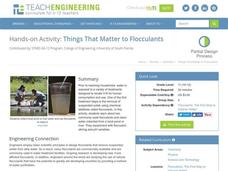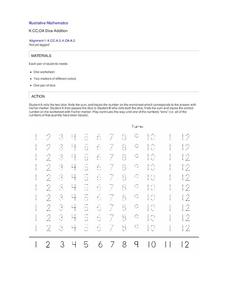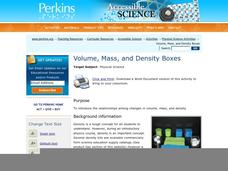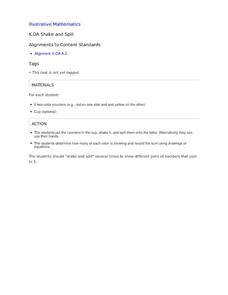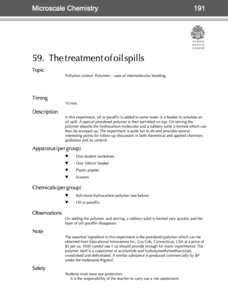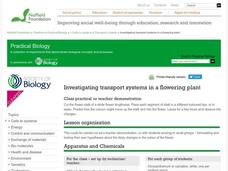Curated OER
2nd Grade - Act. 17: Source Relay
Help your 2nd graders understand the difference between natural and man-made materials. They will sort breakfast food items into sources: store, factory, natural world, and farm. They will work together to classify, form conclusions, and...
Curated OER
Salt of the Earth: A Caddo Industry in Arkansas
Middle schoolers explore the history of the Caddo Salt Industry found in Arkansas. Along with learning about how salt deposits formed in Arkansas, learners study the process of salt production and how valuable salt is as a natural...
Curated OER
Solid Waste
Students determine the percentage increase in output of solid waste in the U.S. They determine the length of time it takes for throw away items to decompose.
Curated OER
Popular Music of Brazil: Samba
Samba music is a musical mixture of both African and Brazilian sounds and rhythms. Explore this art form with your class using this easy-to-follow slide show. They'll learn about Samba's roots, beats, characteristics, instruments, and...
Curated OER
Animal Homes
Match animals to their environments with a cute lab activity. Kids draw a line between each animal, such as a fish, a rabbit, and an ant, to the place where it lives. For hands-on practice, a science investigation instructs learners to...
Teach Engineering
Things That Matter to Flocculants
How does the dirt get out of your drinking water? A hands-on activity introduces the use of flocculants to help clear solid particles out of water. The plan walks learners through the process of setting up an experiment that controls the...
Curated OER
Dice Addition
Using the provided tracing number worksheet, a pair of kindergartners will practice their adding skills. Player A will roll two die, add the sum, and then trace the sum on the worksheet. Player B will take a turn and do the same. The...
Illustrative Mathematics
How Many _______ Are In. . . ?
Help your learners gain meaningful understanding of dividing fractions using fraction models. The activity includes nine problems which are sequenced to show how the fraction division algorithm evolves. Have students use graph paper or...
Macmillan Education
A Wrinkle in Time Discussion and Activity Guide
As you work through Madeleine L'Engle's A Wrinkle in Time, try out some or all of the 20 questions and activities included here. Useful for discussion questions, group assignments, or individual projects, this resource covers plot as...
Perkins School for the Blind
Volume, Mass, and Density Boxes
Mass and density are difficult topics for kids to understand, and even more difficult when you have visual impairments or blindness. Learners will make boxes and fill them with cotton, sand, or crushed paper. They will feel the density...
Illustrative Mathematics
Shake and Spill
Entertaining as well as educational, this math activity about decomposing numbers is bound to capture the engagement of young learners. Given a cup and five two-color counters, young mathematicians simply shake and spill the cup,...
Institute of Electrical and Electronics Engineers
Blast Off!
With the use of a model rocket kit, aspiring aerospace engineers work cooperatively to construct and launch a rocket. A preparatory reading assignment is included, covering Newton's laws of motion and information about the first...
Exploratorium
Touch the Spring
Concave mirrors and the images they produce are traditional topics in the physics classroom. This resource explains how to set up an investigation of them, and it provides you with the explanation of concepts.
Exploratorium
Hot Spot
Not only does a concave mirror focus light waves, it can also concentrate infrared radiation into a hot spot. If you have a small electric heater and such a mirror, demonstrate this for your physical science class.
National Security Agency
Are You Game? A Lesson Connecting Fractions and Probability
Exactly how fair are the board games children grow up playing? Young mathematicians investigate this questions as they work their way through this five-lesson series on basic probability.
Teach Engineering
Water Remediation Lab
Water filtration — that's pure genius! Groups test the ability of a water filter to purify water by running chlorine contaminated water through a filter and measuring the chlorine concentrations as they filter the water. They then graph...
World Intellectual Property Organization
Learn from the Past, Create the Future: Inventions and Patents
3D printers, selfie sticks, smart watches. GPS, self-driving cars, YouTube. Imagine life without inventions. Believe it or not, these items were all invented in the last 10 years. Inventions, and the inventors responsible for them, are...
Maker Media
Makerspace Playbook
Make the most of project-based learning with Makerspace. A playbook shows instructors and other interested parties how to set up a Makerspace and Maker community to foster STEM projects. It gives ideas for startup activities and for...
Cornell University
Polymers: Making Silly Putty
Putty is proof that learning can be fun! Share the wonderful world of polymers with your class through an experiment. Young scientists create their own silly putty, then examine its properties.
Royal Society of Chemistry
The Treatment of Oil Spills—Microscale Chemistry
When oil spills happen, how is the oil cleaned up? Pupils of polymer science discover an amazing substance that turns oil into a solid during a microscale experiment. Individuals observe oil or paraffin before and after addition of the...
Nuffield Foundation
Investigating Transport Systems in a Flowering Plant
Some weddings have flowers in a unique, unnatural color to match the theme. Young scientists take part in this process to learn about the function of the xylem as they observe colored water moving through a flower. Then, they experiment...
National Nanotechnology Infrastructure Network
Lines on Paper - Laser Box
See what you cannot see by getting a little creative. An intriguing lesson has learners use lasers to explore X-ray diffraction. Given a box with unknown structures, they shine a laser through the box and interpret the results....
Nuffield Foundation
Microbes Ate My Homework
Now you have a new excuse not to do your homework. A long-term experiment has learners explore cellulose-digesting enzymes. They simulate how paper breaks down in a compost bin. There's no need to blame your dog for eating your homework...
Children's Theatre of Cincinnati
A Charlie Brown Christmas Study Guide
Bring A Charlie Brown Christmas to social studies, language arts, math, science, and art class! Learners ponder the meaning of Christmas trees, write about Christmas during the original release of the television special, research holiday...







